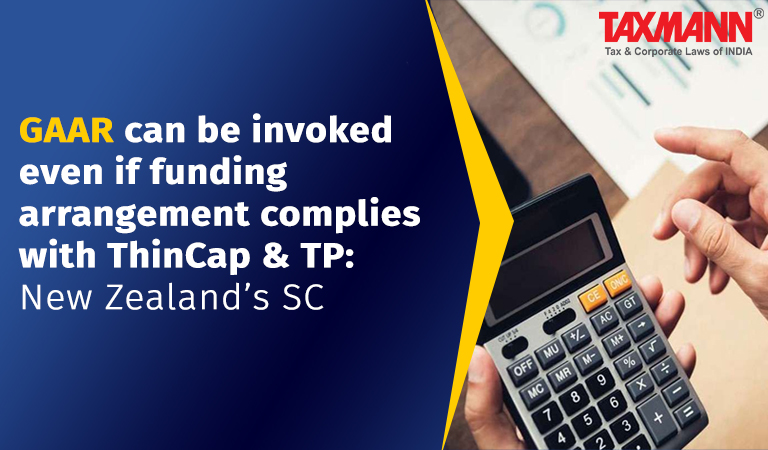GAAR can be invoked even if funding arrangement complies with ThinCap & TP: New Zealand’s SC
- Blog|News|International Tax|
- < 1 minute
- By Taxmann
- |
- Last Updated on 11 October, 2022

Case Details: Frucor Suntory New Zealand Ltd. v. Commissioner of Inland Revenue - [2022] 143 taxmann.com 114 (SC-NZ)
Judiciary and Counsel Details
-
- William Young, Glazebrook, O’regan & Ellen France, JJ.
- L McKay, M McKay & H C Roberts for the Appellant.
- J B M Smith KC, E J Norris & L K Worthing for the Respondent.
Facts of the Case
The Supreme Court of New Zealand has ruled that interest paid on related party debt was liable to be disallowed under GAAR even if the funding arrangement complies with Thin Cap &Transfer Pricing rules.
The Court justified revenue’s action of invoking the General Anti Avoidance Rule (GAAR) to disallow deduction to interest payments on the convertible note where the interest payments were in substance repayments of principal.
Supreme Court Held
It was held that GAAR is applicable even though the funding arrangement fell within the ambit of interest deductibility provisions and also complied with applicable Special Anti-Avoidance Rules (SAARs) of Thin Capitalisation Rules (debt-equity ratio limit) and Transfer Pricing (arm’s length interest rate).
Disclaimer: The content/information published on the website is only for general information of the user and shall not be construed as legal advice. While the Taxmann has exercised reasonable efforts to ensure the veracity of information/content published, Taxmann shall be under no liability in any manner whatsoever for incorrect information, if any.

Taxmann Publications has a dedicated in-house Research & Editorial Team. This team consists of a team of Chartered Accountants, Company Secretaries, and Lawyers. This team works under the guidance and supervision of editor-in-chief Mr Rakesh Bhargava.
The Research and Editorial Team is responsible for developing reliable and accurate content for the readers. The team follows the six-sigma approach to achieve the benchmark of zero error in its publications and research platforms. The team ensures that the following publication guidelines are thoroughly followed while developing the content:
- The statutory material is obtained only from the authorized and reliable sources
- All the latest developments in the judicial and legislative fields are covered
- Prepare the analytical write-ups on current, controversial, and important issues to help the readers to understand the concept and its implications
- Every content published by Taxmann is complete, accurate and lucid
- All evidence-based statements are supported with proper reference to Section, Circular No., Notification No. or citations
- The golden rules of grammar, style and consistency are thoroughly followed
- Font and size that’s easy to read and remain consistent across all imprint and digital publications are applied



 CA | CS | CMA
CA | CS | CMA
